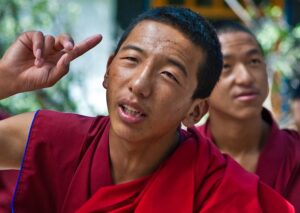Debate, Discussion, and Dialogue at LFBCS

Debate, as such, is a very aggressive and structured experience in a traditional Tibetan monastery. The monks debate specific subjects using strict rules and procedures. The process is based on logic and reasoning as developed by Dharmakirti, a 6th-7th century Indian Dharma King who was considered to be the founder of the Pramana School of Logic and Reason. His commentary, the Hetu-Vidya Treatise, on the Pramana samuchavva (Compendium on Valid Perception) by Dignaga (480-540) is one of the most important treatises studied in a Tibetan University. Although Shakyamuni Buddha never taught a system of logic as such, the logic which was devised by Dharmakirti was based entirely on what the Buddha said. H.H. Dorje Chang Buddha III has repeatedly stated that one of the strengths of the Tibetan system of Buddhism is the use of debate to develop deeper understanding of Buddhist doctrine and principles. By using the interactive program established at the Learning from Buddha College & Seminary (LFBCS) that is based on the Buddha Master’s “Seven Dharma System,” we hope to encourage this concept.
It must be stressed that the purpose of this discussion is not to defeat or embarrass a mistaken opponent and somehow gain victory for oneself, but to help the opponent overcome wrong views and cloudy understanding. This process should make the student stronger, gain mental clarity, and develop analytical capacity. In formal Tibetan-style debate, there are two persons involved: a Defender who sits and gives answers to the Challenger who stands and asks questions. The defender puts forth his or her position for which he or she is held accountable by the Challenger. In Tibet there would be two hours in the morning and two hours in the evening set aside for debate which would usually be held outdoors, no matter what the season. They would be held in the debating courtyard with no props or books or notes. The debaters must depend on their memorization of the points of doctrine and their measure of understanding gained from study. This system cannot be followed exactly at LFBCS, but the concept will still be utilized. Positions would be defended and challenged based on the “128 Evil and Erroneous Views” expounded by H.H. Dorje Chang Buddha III and other points of doctrine.
Manjushri Bodhisattva would be invoked at the beginning of these sessions by the Facilitator. Manjushri, being the manifestation of the wisdom of all the Buddhas in the ten directions, is the special protector of debate. Anyone who wishes to challenge another’s work must also state that they are doing so as to overcome the wrong views and doubts of the student being challenged. This must be done with the right motivation which is to liberate all sentient beings.
It is noted in Debate in Tibetan Buddhism, that “since the generation of final wisdom is not easy and one must be strong, the debaters assert firmly their learning, seeking to become solid in their knowledge.” In fact, the Challenger may draw on his powers of persuasion and skills in debate to even trick, test, and sometimes deliberately befuddle the Defender. This may seem devious, but “if the purpose for debate is to generate knowledge in one’s own continuum, then that knowledge must be firm and sure. If a Defender can be coerced away from a correct position by a clever Challenger, then his understanding is not solid.”[1]
There is also the tradition that the Challenger does not explain what the correct position is to the defender. He will show where there may be inconsistencies in logic, but not provide any “correct” interpretation of what it should be. This is partly due to the emphasis on having one come to one’s own understanding and it may also be because the Challenger does not know the answer either, even though he or she is able to express the problem. The Challenger may see inconsistencies in another’s position without having a detailed understanding of the topic being discussed. In Tibet, these debates are usually conducted between more or less peers. The debaters rely on the great texts and commentaries and the teachings of the Buddhas, but debate is not a mere rote repetition of the commentaries of others, but an active intellectual exercise, since the understanding must be one’s own.
What is unacceptable is passive acceptance and any lackluster performance. The debaters need to be able to quickly respond and with great enthusiasm. H.H. Dorje Chang Buddha III has discoursed several times on the benefits of debate in gaining a firm and deep understanding of the dharma. It is included as one of the Seven Dharmas required in listening to dharma discourses and part of the courses offered at LFBCS.
CLICK to go to more detailed discussion of the Seven Dharma System of learning expounded by H.H. Dorje Chang Buddha III.
CLICK for more information on Debates and any of the full courses that require debating for Seminary students.
[1] P. 31 Daniel Perdue, Debate in Tibetan Buddhism.
